Crude Conversations
”Crude Conversations” features guests who represent a different aspect of Alaska. Follow along as host Cody Liska takes a contemporary look at what it means to be an Alaskan. Support and subscribe at www.patreon.com/crudemagazine and www.buymeacoffee.com/crudemagazine
Episodes
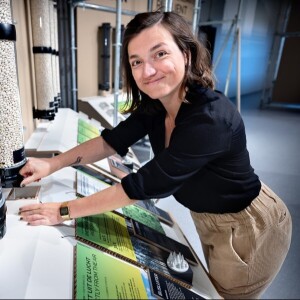
Thursday Oct 12, 2023
Thursday Oct 12, 2023
Until recently, Lizzy Bakker was the senior exhibition maker at NEMO Science Museum in Amsterdam. NEMO is all about interacting with science and technology in order to better understand the world around us, to make its visitors curious about the mechanisms that shape their lives. It turns out, exhibition design conveys a lot. Research carried out by NEMO found that if an exhibition has an unsustainable look and feel to it — ultimately an unsustainable design — then people won’t take the message seriously. So, it’s important for them to work toward creating exhibitions that are as sustainable as possible.
Right now, NEMO is focused on sustainability and the climate crisis. This year, staff came together to create The Green Team, a cohort dedicated to putting sustainability high on the museum’s agenda. Among other things, this means creating sustainable exhibitions — reusing parts of previous exhibitions for future ones, for example. It also means helping to create exhibitions that talk about the climate crisis. Currently they have an interactive exhibition called Energy Junkies where you can make decisions about the world’s energy system that will determine a more or less sustainable future. The idea is for people to understand the climate crisis and how energy production is related to it, and the different solutions that are available for individuals, businesses and governments.
In this Chatter Marks series, Cody and co-host Dr. Sandro Debono talk to museum directors and knowledge holders about what museums around the world are doing to adapt and react to climate change. Dr. Debono is a museum thinker from the Mediterranean island of Malta. He works with museums to help them strategize around possible futures.
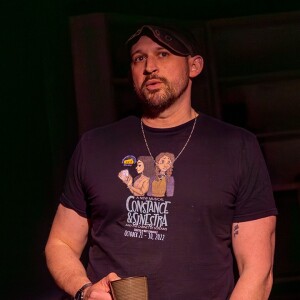
Saturday Sep 30, 2023
Saturday Sep 30, 2023
In this one, Cody talks to Matt Fernandez of Anchorage Community Theatre. Matt’s association with ACT goes back to before he was even born. His mom was involved in ACT and was the Assistant Director of the play Bus Stop in 1968. He actually still has the playbill for that show. Fast-forward to 1989 and he’s watching his first show. It’s Oliver Twist, it’s an ACT production and his brother is in it. Three years later, in 1992, Matt personally got involved with ACT. He’s 12 and the Alaska theatre legend Bob Pond gives him a non-speaking role in A Christmas Carol. He got the non-speaking role because he stuttered throughout the entire audition, but Bob casted him anyway — Bob had a tendency to recognize when someone needed a role, either to be part of the theatre community or to boost their self-esteem. The next role Bob gave Matt was in Inherit the Wind. It was a speaking role and he had the opening monologue. To this day, Matt says it was the best speech therapy he’s ever had.
The history of Anchorage Community Theatre is important to Matt, mostly because there’s a lot there. It’s been around since the 1950s, before Alaska was even a state. That’s 70 years of local theatre and community. The longstanding tradition of military personnel involvement is a big part of its history. It goes back to 1953, during the Korean War, when ACT’s founder Frank Brink was stationed in Kodiak. He was a naval officer and he was also running Anchorage Little Theatre, so he decided to see if the theater-writing team Rodgers and Hammerstein would allow him to do South Pacific, a musical about World War II. They did, and thus began a heritage of military involvement in ACT that continues to this day. To solidify his point about history, Matt talks about a photo taken after the 1964 Good Friday earthquake. In it, the streets of 4th Avenue are split and collapsed, shops are destroyed, and above it all is a banner advertising “Our Town,” an ACT play.
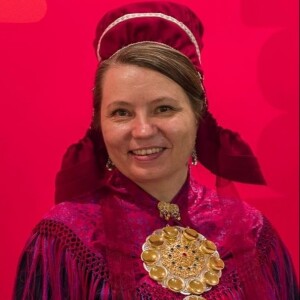
Saturday Sep 23, 2023
Saturday Sep 23, 2023
Anne May Olii is the Director of the largest Sámi museum in Norway, RiddoDuottarMuseat. The museum manages photographs, art and information on Sámi cultural heritage. Anne May says that the museum is thinking 100, 200 years into the future, about how what they’re documenting today will affect and inform Sámi people in the future. For example, the vitality of reindeer husbandry — something the Sámi people have been practicing for generations — is a concern. On top of climate change causing diminishing grazing areas, the Norwegian government is taking land from the Sámi people by putting things like windmills and power lines on their land.
Anne May says that the museum is focused on documenting these changes, to keep a record of the past and the present in order to inform the future. That there’s a strong possibility that northern countries will be looked at for guidance in a future affected by climate change. She has a vested interest in Norway. In addition to her work at the museum, she’s a farmer, her husband is a reindeer herder, her kids are farmers and reindeer herders, and she’s of Sámi heritage.
In this Chatter Marks series, Cody and co-host Dr. Sandro Debono talk to museum directors and knowledge holders about what museums around the world are doing to adapt and react to climate change. Dr. Debono is a museum thinker from the Mediterranean island of Malta. He works with museums to help them strategize around possible futures.
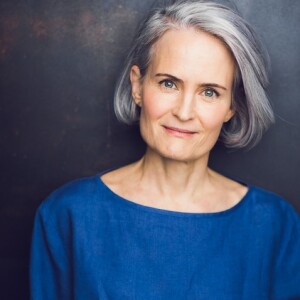
Sunday Sep 17, 2023
Sunday Sep 17, 2023
Miranda Massie is the Director and founder of the Climate Museum in New York City. The Climate Museum uses the power of arts and cultural programming to create an ongoing and progressive conversation surrounding the climate crisis. Her institution is committed to inspiring climate activism through art. The work she and her crew does invites people to recognize their own ability to act on climate change. It’s an advocacy museum, she says, where they hope their audience will take action, to consider themselves as climate ambassadors who actively engaged in climate change action.
Miranda says that appealing to a rationalist perspective doesn’t work. That’s actually how she found her way to creating the Climate Museum. It was 2012 and Hurricane Sandy was wreaking havoc on New York City. She lives in the city, so she watched as the effects of climate change were brought to her front door. Before that, she had understood climate change on a rational level, but faced with the destruction caused by the hurricane she was compelled — emotionally — by the urgency and the challenges of the climate crisis. So, she made a radical shift, she quit her job as an attorney and created the Climate Museum. Her mission then as it is now, was a deep civic shift toward climate dialogue across people’s personal and professional lives. A ubiquitous understanding and acceptance of the crisis that will lead to meaningful climate policy.
In this Chatter Marks series, Cody and co-host Dr. Sandro Debono talk to museum directors and knowledge holders about what museums around the world are doing to adapt and react to climate change. Dr. Debono is a museum thinker from the Mediterranean island of Malta. He works with museums to help them strategize around possible futures.
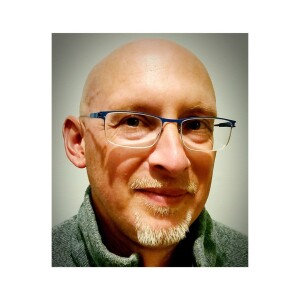
Thursday Aug 31, 2023
Thursday Aug 31, 2023
Lath Carlson is the Executive Director of the Museum of the Future in Dubai. The Museum of the Future is dedicated to telling stories about how humans might adapt to current global crises. Right now, the climate crisis is the most pressing issue. For example, the main story takes people on a journey to 2071, where they experience a world where people have adapted to climate change by collecting solar energy from the moon and beaming it back to earth, giving clean energy to the majority of the world. In order to ensure the science behind these ideas, the museum worked with collaborators from around the world who vetted the science, including people at NASA and at the European Space Agency. Recently, Stanford University proved that this technology wasn’t just something created by a museum, it was actually possible.
The Museum of the Future opened its doors in 2022 and since then over 20 world leaders have visited. Lath says that this is important because climate change is an issue that requires international collaboration. These leaders are among the ones in a position to make changes that will positively impact their countries. Because climate change is an issue that requires large-scale structural changes, the best thing individuals can do is lobby their governments for change. Lath goes on to say that the best hope we have for addressing some of these complex challenges is more Indigenous knowledge than scientific understanding because scientific understanding and reductionist understanding is, in a lot of ways, what got us to where we are today.
In this Chatter Marks series, Cody and co-host Dr. Sandro Debono talk to museum directors and knowledge holders about what museums around the world are doing to adapt and react to climate change. Dr. Debono is a museum thinker from the Mediterranean island of Malta. He works with museums to help them strategize around possible futures.
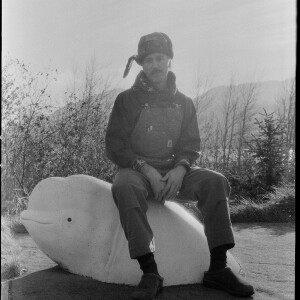
Thursday Aug 31, 2023
EP 136 Frances changed my life with John Gourley
Thursday Aug 31, 2023
Thursday Aug 31, 2023
In this one, Cody talks to John Gourley of Portugal. The Man. John grew up in a cabin in Trapper Creek, Alaska, living close to the land. His parents ran the Iditarod — a 1,000 mile-long sled dog race through some of the most treacherous conditions in the world. It takes skill, endurance and fortitude. For John, it’s a lot like being in a band, but instead of making it to Nome, they’re trying to make it to their next gig. It’s its own endurance race that really only considers the present. It’s a lifestyle that lands somewhere between frugality and stardom. Between spending a dollar a day on food in their leaner times and performing at Red Rocks and Radio City in times of prosperity. It’s been a journey that was never about winning a Grammy or critical acclaim, it was always about the music.
John says that when he writes music, he thinks of snowboarding. Of cliffs, jumps, rollers and powder. Hatcher Pass — the mountains John grew up hiking and riding — is in his rhythm and his lyrics. That association is intuitive for him. Simply put, throwing yourself off a cliff or off a jump is like throwing yourself into music and performing. Sometimes you lose and sometimes you win. But you learn from your failures and you’re buoyed by your wins. And it’s in those winning moments that give you the strength and the reassurance to continue. Like snowboarding or the Iditarod, there are always going to be struggles, but it’s how you work through those struggles that define you.
This new album, “Chris Black Changed My Life,” was marked by struggle and uncertainty. Three band members went to rehab, John broke his jaw, their good friend Chris Black passed away and John and Zoey’s daughter Frances was diagnosed with DHDDS, a rare neurodegenerative disease. It’s been a lot, and navigating it is ongoing. The three who went to rehab are doing much better now and John’s jaw is on the mend. Chris is missed and thought about often, and after an exhausting amount of research, Frances is in treatment.
PHOTO / Maclay Heriot
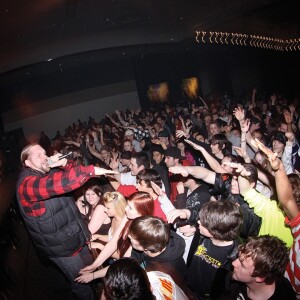
Thursday Aug 10, 2023
EP 135 What happened is what was supposed to happen with Josh Boots
Thursday Aug 10, 2023
Thursday Aug 10, 2023
In this one, Cody talks to Josh Boots. He’s been a fixture in the Alaska rap scene since the 90s, back when he helped form Arctic Flow Records. It’s a legacy that solidified him as one of the best, most authentic lyricists in Alaska. He says that he and the rest of Arctic Flow truly believed that they would one day take over the world with their music. It was a belief and a dream supported by talent and selling weed. That was a big part of maintaining the dream for Josh — the weed — it brought in the money that supported his lifestyle. Since 18, that was mainly what he did for work. Now, at 44, he owns and operates a legal dispensary in Anchorage. He says that making that transition from the traditional market to the legal one was a huge jump, but there are similarities. Like how you treat the customer and how you operate in the industry. Those principles that kept him successful in the old market are now crossing over into this new, legal market.
There was this moment when he was mixing his first album, “Cold Weather Survival Guide,” at Unique Studios in Time Square. He was looking out of a 10th story window thinking, “We’re here. We made it.” Partly because all of the action outside — the Puerto Rican Day Parade was going on and he had a clear view of Total Request Live — and partly because of all the greats who had recorded at that same studio. James Brown, Ice T, Tupac, Nas, Madonna, Public Enemy, Big Pun, Mobb Deep, the list goes on. And now, at 21 years old, Josh was there too. It was a dream come true. The rebellious kid who had little to no supervision and a tumultuous upbringing, just running up and down the streets of Muldoon causing trouble, was now on the path to being a household name.
But he had to make a choice: Chase this rap dream or be a family man. He and his wife were in their 20s and they were starting to have kids — they would eventually have six — and he wanted to give them the upbringing that he never had. Although he never wanted for anything, including love and affection, he grew up in a rough household with lots of partying, drugs and alcohol, and he knew that’s not the environment he wanted to raise his own kids in. So, he chose to be a family man instead of a rapper. It’s a decision he’s thought a lot about over the years. Did he give up on his dream or did he follow his destiny? Ask him and he’ll tell you, what happened is what was supposed to happen.
PHOTO / Leif Ramos
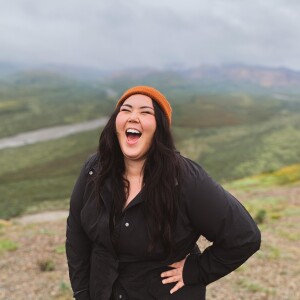
Sunday Jul 30, 2023
Sunday Jul 30, 2023
Cordelia Qiġñaaq Kellie specializes in cross-cultural communications. It’s a position that gives her the space and the opportunity to learn about how cultures interact at the community level. For the last two years, she’s worked as the Special Assistant for Rural Affairs for Senator Lisa Murkowski, where she helps to build and strengthen regional and statewide rural and Alaska Native relationships.
She says that in her line of work people often use the term “cultural conflicts” to describe disagreements that arise because of different values and belief systems. However, she prefers the term “cultural contrasts” because not all the time do those things conflict. She gives an example: Whenever her mom’s Inupiaq family would visit, she was expected to tend to and revere her elders, whereas when her dad’s parents would visit from Washington state they wanted to tend to the children. She recognized that these behaviors weren’t in conflict, each one just had a different set of expectations. So, it’s important to learn and to talk about the contrasts before they become conflicts. It comes down to recognizing, understanding and respecting other cultures — their values and their tenets.
Cordelia grew up in Wasilla. The first time she visited the lands of her heritage — Utqiagvik and Wainwright — she was a young adult. She remembers seeing the environment that her mom had been describing to her for so long and how striking it was. Her biggest takeaway was seeing other Inupiaq people. It was her first time in an Inupiaq community and so much of it reminded her of her family. It gave her an incredible sense of belonging because until that point the only other Inupiaq people she encountered were part of her family. It was the first time she realized that she was part of this bigger network of people.
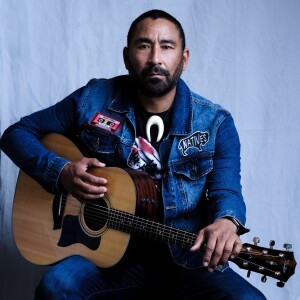
Sunday Jul 23, 2023
EP 134 Inuit soul music with Qacung
Sunday Jul 23, 2023
Sunday Jul 23, 2023
In this episode, Cody talks to Qacung of Pamyua. Qacung and his brother, Philip, started Pamyua almost 30 years ago. The idea was to honor both sides of their heritage — African American on their dad’s side and Yupik Inuit on their mom’s side. The gospel music they heard in church and the traditional songs and dancing they experienced in their Native communities made a powerful impression on both of them. In fact, Pamyua’s sound would eventually be called tribal funk or Inuit soul music, and their performances looked a lot like a traditional ceremony with music and dance. The idea connected with people from the very beginning. Two weeks after they came up with the idea for Pamyua, they were performing in front of high school audiences, including the school they both graduated from, Wasilla High School. There were ten shows in all and they received $1,000 for all of their performances.
The only doubt Qacung and his brother, Philip, had in the beginning of Pamyua was whether or not their elders would accept it. They understood that they were making drastic changes to traditional dances and traditional songs. Their elders’ stamp of approval came quickly, though, and from that point on they never had any doubts that people would accept and enjoy their music and their performances. Qacung says this is because music is an international language, you don’t need to understand the Native languages being spoken or sung to receive its message.
Qacung says that he and his brother have become uncles to up-and-coming Native artists. They share industry knowledge, opportunities and even their own pitfalls throughout the years so that future generations have a better understanding of what works and what doesn’t work. It’s a position he takes pride in. He loves being able to advocate and support new artists on the ins and outs of the business end of things because it’s something he and Philip didn’t have.
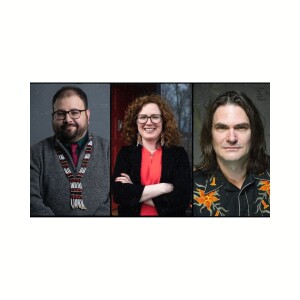
Wednesday Jun 28, 2023
Chatter Marks EP 65 Anchorage made me who I am today
Wednesday Jun 28, 2023
Wednesday Jun 28, 2023
Aaron Leggett is the president of the Native Village of Eklutna and the Senior Curator of Alaska History and Indigenous Culture at the Anchorage Museum. He grew up in Anchorage, so his memories of it involve all of the memorable and formative experiences that made him who he is today. The same is true for the other two people joining the conversation, Julia O’Malley and David Holhouse. They’re both longtime journalists from Alaska and from pretty much the beginning of their journalism careers, they were the voice of the people. Alaskans who reported on cultures and countercultures, crime, food and anything else newsworthy that happened in their close-knit community.
At its core, this is a conversation about what a place means to its inhabitants. How it shapes and molds them. It’s about why David, Julia, Aaron and myself all continue to try and capture the Anchorage we grew up in, before Alaska was so connected to the rest of the world. For my part, I’ve spent a lot of time trying to capture the essence and the feeling of the Alaska snowboard and skateboard scene of the 90s and early 2000s. Holthouse talks about his memories of the Anchorage punk scene in the mid-90s, another lively and sometimes provocative group of people. Aaron remembers a heavy metal group of Alaska Native guys who wore leather jackets, had long hair and smoked cigarettes. They were metal and they were Native. When recalling these stories, there’s fondness, melancholy and nostalgia — a feeling Julia says is a cousin of grief. That if you become too nostalgic, you might lose track of how to listen to the present moment.





